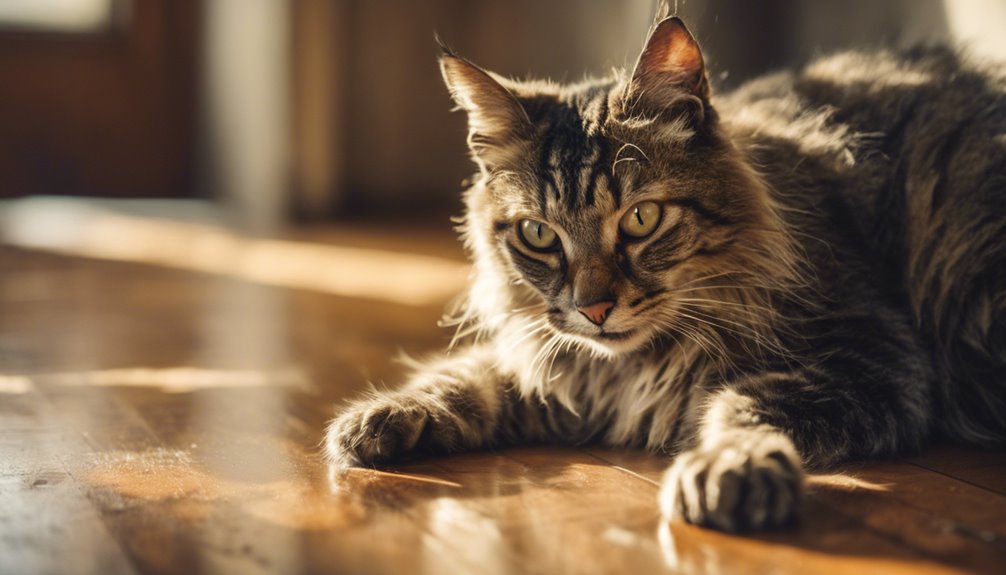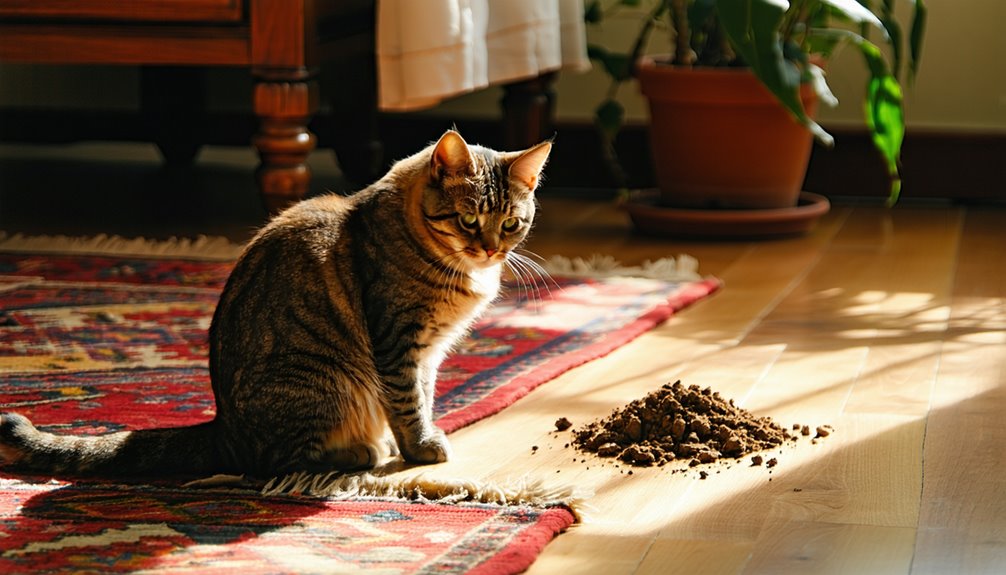If your cat's pooping on the floor, it's important to evaluate several factors. Health issues, like gastrointestinal disorders or dietary changes, can lead to this behavior. Cats can also have specific preferences for litter box materials and setups, and if they're unhappy, they may avoid using it. Stress from loud noises or new pets can trigger anxiety, causing them to seek alternative spots to relieve themselves. Additionally, territorial behaviors or changes in routine, especially in aging cats, might also play a role. Understanding these underlying causes can help improve their habits, and there's more to explore on this topic.
Common Health Issues

When your cat poops on the floor, it can be distressing, and it's important to contemplate that underlying health issues might be at play. Often, dietary changes can trigger gastrointestinal disorders, leading to discomfort and erratic bathroom behavior. Cats are sensitive creatures, and their digestive systems can react negatively to sudden shifts in their diet or low-quality food. Conditions like inflammatory bowel disease or parasites can also contribute to their bathroom troubles. Observing other symptoms, such as vomiting or lethargy, can provide significant clues. If these issues persist, consulting a veterinarian is essential. Understanding your cat's health can empower you to create a nurturing environment, ensuring they feel secure and comfortable in their home.
Litter Box Preferences
Understanding your cat's litter box preferences is essential, as these can greatly influence their bathroom habits. Cats can be quite particular about litter box types and the litter materials you provide. For instance, some cats prefer covered boxes for privacy, while others feel confined and prefer an open box. The choice of litter material also plays a significant role; clumping clay, crystal, and natural options can all evoke different reactions. If your cat seems to avoid the litter box, it might be worth experimenting with various combinations. Pay attention to their reactions, as this can guide you in creating a more appealing bathroom environment for them. A little trial and error can lead to a happier, more comfortable kitty!
Stress and Anxiety Factors

Even with the right litter box setup, your cat might still avoid it due to stress or anxiety. It's important to recognize potential stress triggers in their environment, like loud noises, new pets, or changes in routine. These factors can lead to anxiety signs such as hiding, excessive grooming, or aggression. Your cat's behavior might be their way of communicating discomfort. By observing their habits and identifying stressors, you can create a more calming atmosphere. Consider establishing safe spaces, providing enrichment activities, and maintaining a consistent routine to help alleviate their anxiety. Remember, understanding their emotional needs is vital for fostering a sense of security, ultimately encouraging them to feel more comfortable using their litter box again.
Territorial Behavior
While you may think your cat's litter box is their personal sanctuary, territorial behavior can lead them to seek alternative spots for relieving themselves. Cats communicate through scent, and by pooping outside the litter box, they may be engaging in territorial marking. This behavior serves as a way to assert dominance or establish boundaries, particularly if they feel their territory is threatened by other pets or changes in their environment. It is crucial to recognize that your cat's actions are not just defiance but a form of expression shaped by instinct. Understanding this can help you create a more secure environment that respects your cat's need for territorial communication, potentially reducing the likelihood of these unwanted accidents.
Behavioral Changes Over Time

As your cat ages, you may notice subtle shifts in their behavior that can affect their litter box habits. Age-related issues, like arthritis or cognitive decline, can make it harder for them to access their litter box. A once-regular routine might change as they seek out new, more comfortable areas for elimination. These routine changes can stem from physical discomfort or anxiety, prompting them to avoid the litter box altogether. It's important to observe their habits closely; if they're struggling, consider adjusting the litter box's location or type. Providing a low-entry box or ensuring easy access can help accommodate their needs. Understanding these shifts allows you to support your feline friend during this natural change in their life.
Frequently Asked Questions
How Can I Stop My Cat From Pooping on the Floor?
You've probably noticed how frustrating it is when your cat chooses the floor over the litter box. It could be due to litter box preferences or stress factors. First, make sure the box is clean and in a quiet spot. You might want to experiment with different types of litter. Also, observe any changes in your cat's environment that could be causing stress. Addressing these issues can help restore harmony in your home.
Is It Normal for My Cat to Poop Outside the Litter Box?
It's not uncommon for cats to poop outside the litter box, but it can indicate underlying issues. Consider your cat's behavior; stress, health problems, or an unclean litter box might be factors. Cats need a clean, comfortable space to do their business, so make sure the litter box is well-maintained and placed in a quiet area. If the behavior persists, a vet visit could help identify any medical concerns affecting your cat's habits.
Can Diet Changes Affect My Cat's Bathroom Habits?
Imagine your cat as a delicate clockwork mechanism, each gear dependent on the others. When you make dietary changes, it can disrupt that harmony, affecting their digestive health. Cats may respond with altered bathroom habits, as their bodies adjust to new foods. It's important to introduce changes gradually and watch for any signs of distress. Understanding your cat's needs helps guarantee they feel secure and comfortable in their environment.
Should I Punish My Cat for Pooping on the Floor?
Punishing your cat for pooping on the floor isn't typically effective and can worsen cat behavior. Cats don't associate punishment with their actions, leading to stress and anxiety. Instead, consider underlying reasons for the behavior, such as health issues or litter box preferences. Addressing those factors can create a more positive environment for both you and your cat. Fostering understanding rather than punishment helps build trust and encourages better habits.
How Often Should I Clean the Litter Box to Prevent Issues?
You wouldn't want your furry friend to feel uncomfortable, right? Litter box maintenance is essential for a happy kitty. Ideally, you should scoop daily and do a thorough cleaning weekly to guarantee a pleasant environment. This cleaning frequency helps prevent odors and keeps your cat content, reducing the chance of any bathroom mishaps. Remember, a clean box is a happy box, so give your cat the freedom to feel secure in their space!




